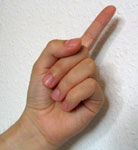1 (number)
natural number one From Wikipedia, the free encyclopedia
Remove ads
One (1) is the first natural number, followed by two, then followed by three. The Roman numeral for one is I.


Remove ads
Mathematics
In mathematics, the number one is the multiplicative identity.[1] It is also the only number for which these special facts are true:
- Any number multiplied by one equals that number: . For example, .
- Any number divided by one equals that number: . For example, .
- Any number , except zero, divided by itself equals one: . For example:
In mathematics, 0.999... is a repeating decimal that is equal to 1. Many proofs have been made to show this is correct.[2][3]
Remove ads
Computer science
One is important for computer science, because the binary numeral system uses only ones and zeroes to represent numbers. In machine code and many programming languages, one means "true" (or "yes") and zero means "false" (or "no").
Other meanings
- In Germany and Austria, one is the grade for "very good". It is the best grade of six possible grades in Germany, and the best of five possible grades in Austria. In the Netherlands, one is the lowest grade, and ten the highest. In Poland, one is also the lowest grade, and the highest is six.
- In numerology, the number one is a symbol for everything (unity), the beginning, and God.
Related pages
References
Wikiwand - on
Seamless Wikipedia browsing. On steroids.
Remove ads







